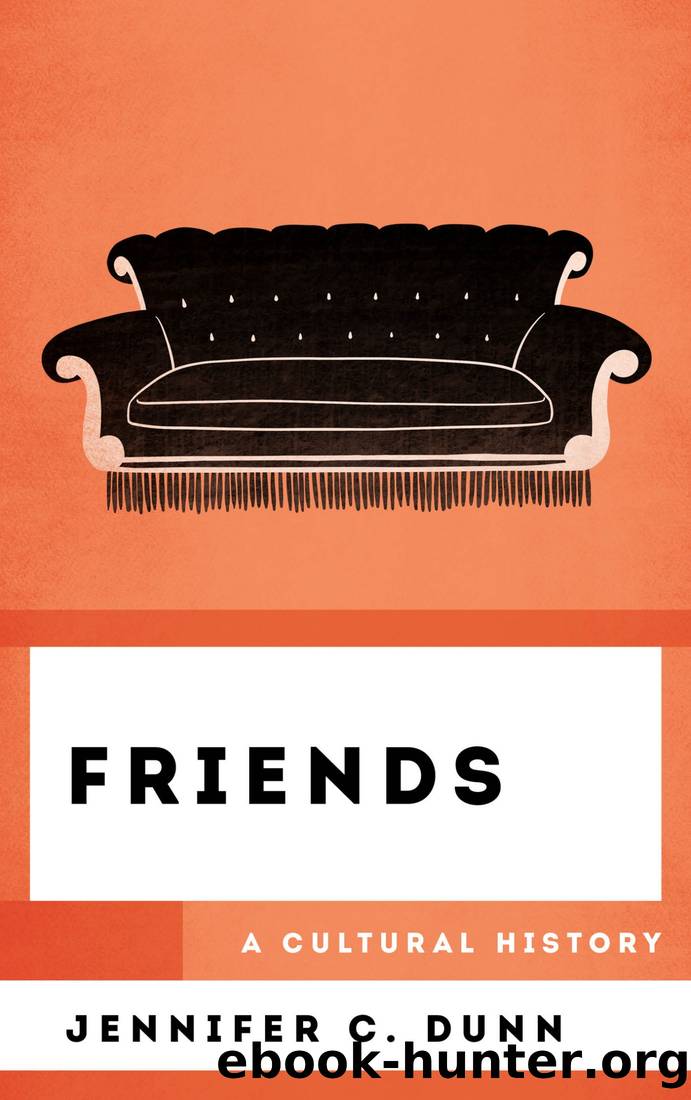Friends: A Cultural History by Jennifer C. Dunn

Author:Jennifer C. Dunn
Language: eng
Format: mobi, epub, azw3
Tags: Tv, Non-Fiction, Illustrated, Media Tie-In, History
ISBN: 9781538112748
Publisher: Rowman & Littlefield Publishers
Published: 2019-12-03T23:00:00+00:00
Joey, Ross, and Charlie at a conference in Barbados.
Warner Brothers / Photofest © Warner Brothers
Having both Gabrielle Unionâs and Aisha Tylerâs characters date both Joey and Ross further privileges the white male characters as individuals and suggests that the seemingly limited black female characters can be interchanged for one another and passed from one man to another.
These episodes also contrast Charlie with Monica. The running joke through both episodes for Monica is that the humidity in Barbados is wreaking havoc with her hair and making it get increasingly curly, until it resembles a Disco-era Diana Ross (or her daughter black-ishâs Traci Ellis Ross currently). While Charlie does not interact with Monica much in these episodes, the rest of the white cast makes comments about how unattractive Monicaâs ginormous hair is. But when Monica decides to do something about her hair, Charlie is there to comment. Monica gets her hair under control with cornrow braids with shells at the bottom. Monicaâs âcultural appropriation sets the groundwork for the key thing her braids doâgive rise to an ironic joke that explicitly characterizes Charlie as inauthentically black.â[23] The friends make fun of Monica by pointing out that she has shellfish in her hair and that they can see her scalp. While Charlie cannot think of anything other than that âitâs somethingâ at first, she later encourages her by saying, âYou go, girlfriend!â The way she says the line reveals her discomfort, prompting Ross to ask if she has ever said that phrase before. She admits she has not. Interestingly, in an earlier season, Monica too tried to be supportive by yelling, âYou go girl!â before she admitted that she could not pull off the phrase (Episode 2.19, âThe One where Eddie Wonât Goâ). At once, âCharlie must suffer Monicaâs commodified consumption of blackness and the ensuing spectacle of whiteness and racism in the episodeâ[24] and Charlie is whitewashed as her inability to use colloquial language is on par with Monicaâs.
Much like the black scientist Peter from the earlier scene who never speaks, Charlie cannot use the black diction that Rhonda did. The classism, racism, and patriarchy that Charlie is required to negotiate as a black character who must assimilate to keep her space among the friends is made explicit. It is a white man who makes it clear that she is unable to perform blackness, precisely because, for the friends, she has never been black.[25]
Charlie ends up then as ânot too blackâ while at the same time she ends up being critiqued for âactingâ black âeven as she is confronted with the spectacle of a white woman who has commodified it and who is found amusing for doing so.â[26] At the same time, this particular white woman has already established that she cannot get away with âacting black.â So both women are established as acting white.
Having set Charlie and Ross up as perfect partners (in contrast to her relationship with Joey), the series then faced the difficulty of how to break them up in order to continue Rossâs trajectory toward Rachel in the end.
Download
Friends: A Cultural History by Jennifer C. Dunn.epub
Friends: A Cultural History by Jennifer C. Dunn.azw3
This site does not store any files on its server. We only index and link to content provided by other sites. Please contact the content providers to delete copyright contents if any and email us, we'll remove relevant links or contents immediately.
Robin by Dave Itzkoff(2437)
Head of Drama by Sydney Newman(2297)
I'm Judging You by Luvvie Ajayi(2202)
The Paranormal 13 (13 free books featuring witches, vampires, werewolves, mermaids, psychics, Loki, time travel and more!) by unknow(2091)
Ten by Gretchen McNeil(1884)
Single State of Mind by Andi Dorfman(1809)
#MurderTrending by Gretchen McNeil(1656)
Key to the Sacred Pattern: The Untold Story of Rennes-le-Chateau by Henry Lincoln(1625)
Merv by Merv Griffin(1610)
Most Talkative by Andy Cohen(1588)
This Is Just My Face by Gabourey Sidibe(1468)
Notes from the Upside Down by Guy Adams(1467)
The Hunger Games: Official Illustrated Movie Companion by Egan Kate(1438)
Springfield Confidential by Mike Reiss(1412)
Binging with Babish by Andrew Rea(1411)
Jamie Oliver by Stafford Hildred(1387)
The TV Writer's Workbook: A Creative Approach To Television Scripts by Ellen Sandler(1347)
Clarkson--Look Who's Back by Gwen Russell(1342)
Blue Planet II by James Honeyborne & Mark Brownlow(1282)
